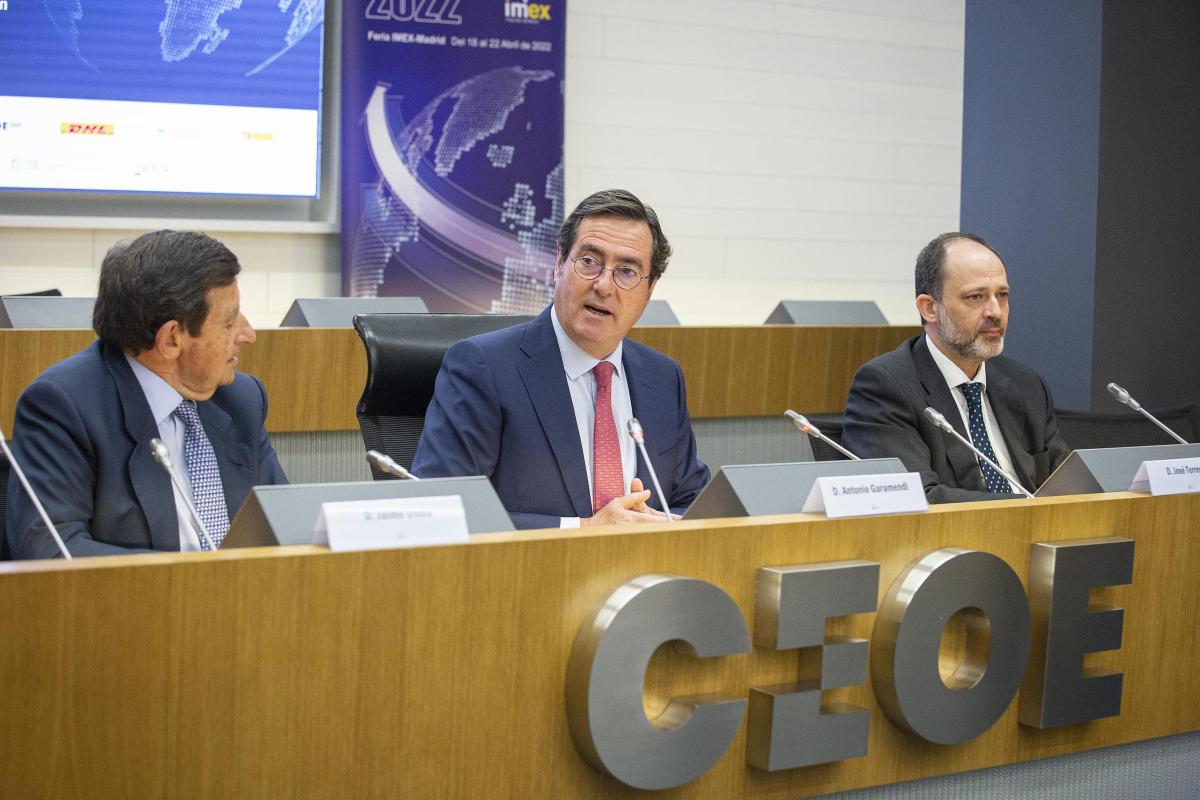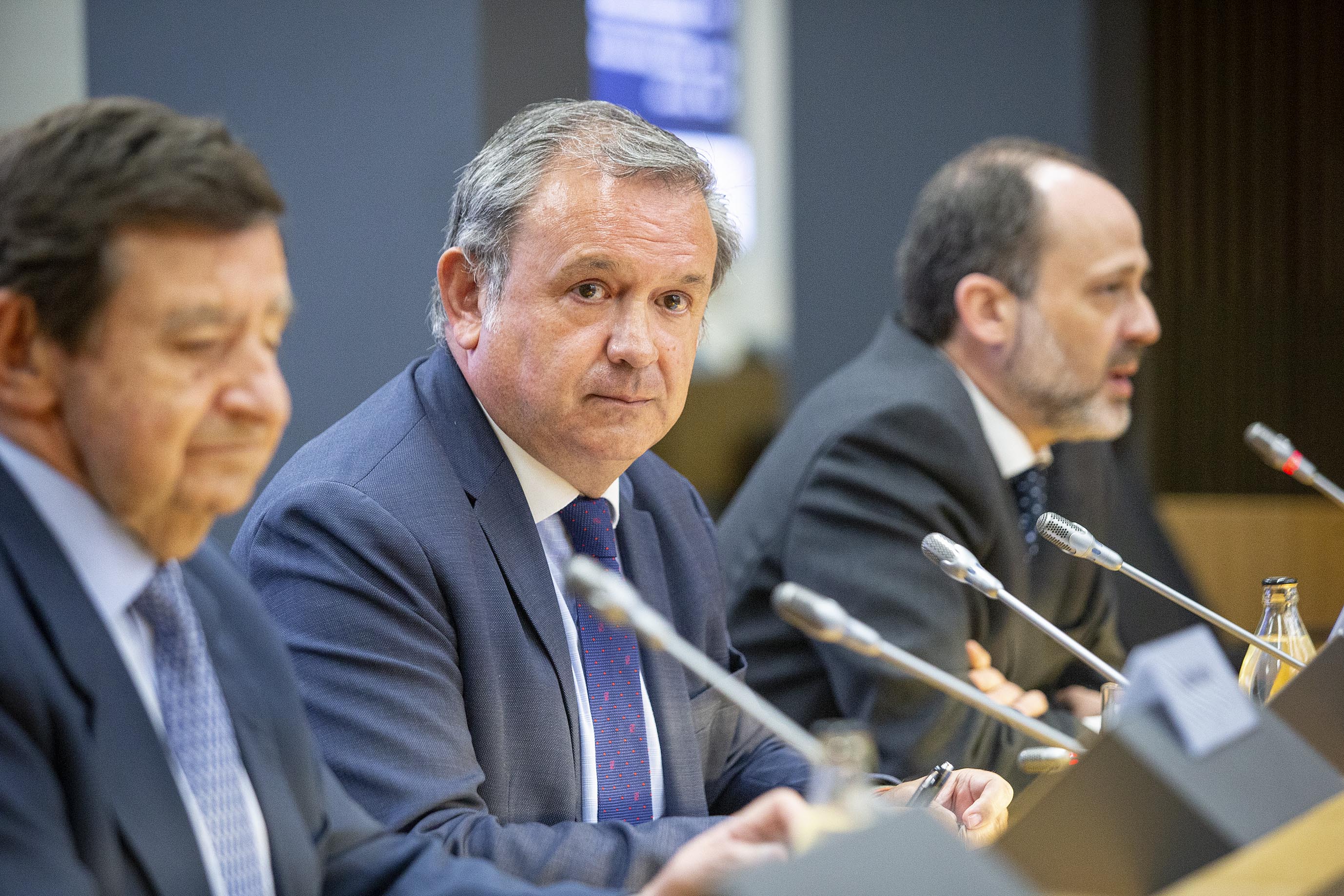The CEOE stresses the importance of concluding ambitious agreements and integrating the SDGs in internationalisation
As part of the 20th edition of IMEX-Internationalisation Week 2022, which is being held in a mixed format from 18 to 22 April at various venues.

The President of the CEOE, Antonio Garamendi, underscored how internationalisation has become a strategic element of our economy and highlighted the importance of concluding ambitious agreements and integrating the SDGs to boost this process, during the inauguration of the fourth day of the 20th edition of IMEX-Madrid, Internationalisation Week 2022, which is being held over these days in a mixed format and from different venues.
Under the slogan “the importance of integrating the SDGs for internationalisation,” leading authorities, representatives of institutions and organisations, and global experts, explored at the CEOE matters of great interest in this stage of economic recovery, such as business’ commitment to sustainability; trade and investment as factors in sustainable development; the importance for Ibero-America of regional integration in the promotion of internationalisation and investment; and talent management.
SDGs, trade agreements, investment and internationalisation
In his speech, the President of the CEOE, Antonio Garamendi, stressed that the SDGs are those that include sustainable development to achieve a future that responds to the great challenges that are arising in the current context. “The economic recovery will be green or nothing,” said Garamendi, and therefore sustainability should be placed at the core of the work agenda. In this regard, he also mentioned other opportunities arising from the pandemic as regards digitalisation; innovation; or investment in research, science and technology, which must be borne in mind in production chains and access to international markets. “Public-private partnerships, as embodied in SDG 17, have proven crucial in an increasingly global world, where borders are being transcended.”
Along these lines, Garamendi also highlighted the importance of intra-regional trade and the reshaping of global value chains with a view to the internationalisation of companies. In the case of Latin America, the President of the CEOE explained, there are two great examples of regional integration that work very well: Mercosur and the Pacific Alliance. The former is embodied in an advanced agreement that not only provides for dismantling tariffs, but also includes crucial chapters focusing on investment, services, public procurement, intellectual property and sustainability, among other areas. In the case of the Pacific Alliance, the CEOE has played a pivotal role thanks to its status as an observer business organisation, since Spain became the first European observer country of this Alliance. “Quality training and education are essential to be ready for the world that awaits us, in which we are committed to the SDGs, regional integration and talent management,” he said.
Priorities at this stage of the economic recovery
Besides the President of CEOE, other speakers at the event included the Digital advisor to IMEX, Fernando Laviña-Richi; the Minister Counsellor of the Brazilian Embassy in Spain, Leandro Zenni; the Advisor for Economic, Commercial and Promotional Affairs of the Mexican Embassy in Spain, Gerardo Javier Guiza; the Head of LATAM Desk of ICEX-Invest in Spain, Adrián Blanco, the Head of Economy and Business of SEGIB, Pablo Adrián Hardy; the senior representatives of business organisations, such as CEAJE and FIJE, SEOPAN, FEIQUE or AENOR; and the heads globally-renowned companies.
In the course of four panels, the speakers examined business’ commitment to sustainability; trade and investment as factors in sustainable development; the importance for Ibero-America of regional integration in promoting internationalisation and investment; and talent management.
In the first panel, the speakers said that sustainability is increasingly becoming part of companies’ DNA, and those that do not include this factor in their business strategy will find it very difficult to survive in the medium to long term. They also stressed the need for companies to set ambitious targets and to use innovation, digitalisation and new technologies to fulfil the SDGs and incorporate sustainability into their internationalisation process. The role of financial institutions in assisting and supporting companies that wish to be sustainable and promote a low-emission economy was also highlighted. Sustainability is an opportunity and not an obligation to position ourselves better in the market and to become increasingly resilient.
Concerning trade and investment as factors for sustainable development, representatives of FEIQUE, ICO and SEOPAN highlighted the importance of foreign trade, distribution, innovation and sustainability to internationalisation. The infrastructure sector is a clear example of success in this respect, since it exerts a pull and multiplier effect on other sectors; there has been a clear evolution in this sector over the last few years. Terms being used more and more, such as “taxonomy”, “green lending” and “sustainability-linked lending” were also discussed. They also stressed the need to work together, to set achievable timelines, to overcome challenges and to turn them into opportunities, to maintain appropriate regulations and required certifications, but rather to seek to simplify bureaucratic procedures.
In terms of regional integration, representatives of the Brazilian and Mexican Embassies, ICEX and SEGIB, said that the internationalisation of companies is becoming increasingly complex in Ibero-America. The region grew by around 7% in 2021 and is forecast to expand by around 2.2% in 2022. The problem, according to the speakers, is that inter-regional trade is at 17% and is still very low compared to other regions such as Asia and Europe, where it stands at 60% or 70%. In this respect, SEGIB’s head of Economy and Business, Pablo Adrián Hardy, explained that “we need to create an appropriate playing field so that companies continue to feel comfortable and safe to continue to invest in the region.” Europe, he said, is going to have to strengthen its ties with reliable partners for the future, and Latin America is certainly among them. The panellists also touched upon new opportunities in digital infrastructure, talent, start-up development, venture corporate, impact investment, knowledge-based services, and natural resource-based services such as green hydrogen. “Ibero-America is a big family, in which proximity predominates, and which has to take advantage of benefits such as nearshoring to become more internationally competitive,” Adrián underlined.
In the last panel of the event, focusing on talent management, representatives of ICEX, CEAJE and FIJE, EAE Business School and Pleo, highlighted some projects of interest that are being launched to enhance the areas of training, education, management and retention of talent, such as ICEX Vives 2023, which will train 2,000 young people per year and expand the range of professionals and educational levels to improve the range of jobs available until now; or the Centre for the Future of Work, which tries to guess what the future of the labour market will be and which reports that work is now digital and sustainable, compared to 2019, when only 31% of Spanish SMEs had a website. Changes concerning sustainability in companies can only be made by people; and it must be taken into account that cultural differences have become much more nuanced in recent years thanks to new technologies. With regard to talent, the Vice-President of CEAJE and Secretary General of FIJE, Antonio Magraner, stressed that it is important not only to create talent, but also to retain and reskill it, as Latin America is one of the regions where most talent is destroyed. Therefore, he pointed out, it is necessary to enhance training, promote internationalisation and maintain a constant and focused learning capacity.
“E” for “Enterprise” and for “Expectations” for the future
The Director General of CEOE International and Permanent Secretary of CEIB, Narciso Casado, stressed that the private sector plays a key role in an increasingly competitive environment, in which societies must be economically, socially and environmentally sustainable. “Business organisations are also facing a historic opportunity to demonstrate the role the private sector plays in the 2030 agenda,” he said, since it is through companies’ ability to manage and mobilise human, technical and financial resources that they fully develop their role as indispensable agents to ensure the sustainable development of our communities. The stable and sustainable growth of the region will depend, to a great extent, according to Casado, on the effort we make to avoid exclusion and to ensure the recovery reaches everyone equally. And the only way to overcome inequalities, he added, is to promote employment as the best formula for social inclusion. To this end, “the same message as always: more companies, small ones becoming medium-sized, those becoming large ones, and encouraging entrepreneurial vocations. No one can be left behind.”
As regards regional integration, said the Permanent Secretary of CEIB, in the growing regionalisation of global value chains of goods and services, we must rely on Europe and Ibero-America as a guarantee of progress, stability and well-being. Today, Casado said, there is greater demand for shorter, less complex and concentrated value chains, which creates opportunities for regionalisation of trade. He also mentioned the important role that multilatinas play as catalysts for intra-regional investment, building market leadership in their local markets and pursuing strategies and capacities that focus on acquisitions and joint ventures as the main mechanisms for international growth. Casado also referred to the potential of young entrepreneurs, whose strength lies in acting now to build a better future together. He also recalled essential concepts such as “retaining talent and reskilling existing talent, ageless, recreate, reconduct, results, resilience, restore (trust), revitalise or reconduct.”
By way of conclusion, the International Director General of the CEOE International also referred to a series of concepts that perfectly define the world of business: Strategy and Excellence; the State, an indispensable and guarantor of Stability; and Equity, which entails justice and leads us to give everyone what they deserve, and there is no better guarantee of this than by making Employment possible. Efficiency, Effectiveness and Effectiveness; Evaluation, which is what companies do all the time; Education; Spirit; Stability; Team; Structure and Infrastructure, especially human infrastructure; Ecology and, above all, Hope for the future of our nations, our citizens and, above all, our companies. “This is the only way we can, together, drive internationalisation, strengthen our companies’ work, make them grow, make them ever stronger and go further, regardless of borders,” Casado concluded.

Related news
A large delegation made up of Spanish business organisations and companies took part this Monday and Tuesday, 9 and 10 September, in two high-level meetings with representatives of the Chinese business world, as part of the official visit of the President of the Government, Pedro Sánchez, to the People's Republic of China.
Even though China is our main trading partner in Asia, Spanish companies still have a long way to go to take advantage of the great business and investment opportunities offered by the Chinese market.
The Ibero-American Secretary General, Andrés Allamand; the President of the CEOE, Antonio Garamendi, and the President of the Ibero-American Arbitration Centre-CIAR, Javier Íscar, inaugurate a conference at the CEOE on Ibero-American arbitration. They stress the importance of continuing to support arbitration as an effective and safe instrument for resolving disputes in the region.
Business and investment opportunities in Medellin and the Metropolitan Area were assessed for the Spanish companies with interests in the area.






